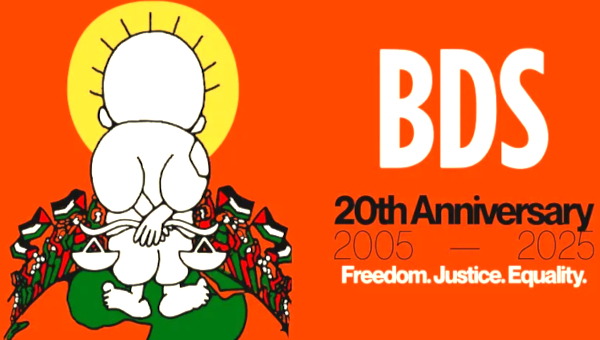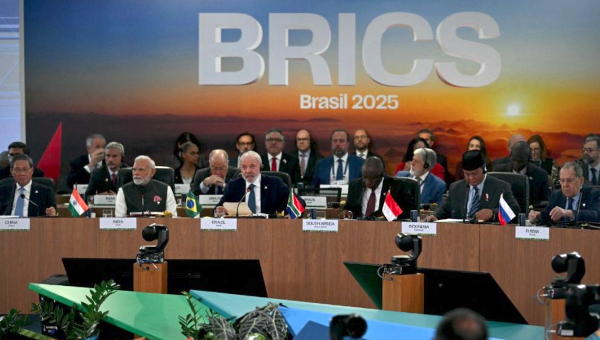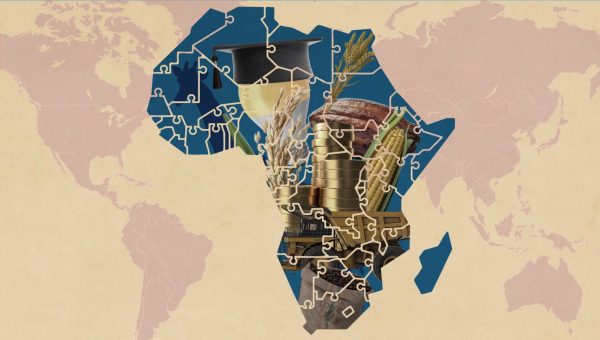The German Federal Elections
Centre-Right Wins Majority,
Social Democracy Suffers Crushing Defeat,
The Left Receives a Boost
Conservative Chancellor Angela Merkel, who was leading a coalition government with the Social Democratic Party (SPD) since 2005, will also lead Germany’s next government; this time with support from the liberal Free Democratic Party (FDP). In an election that saw voter turn out at a record low of 70.8%, Merkel’s party, the Christian Democratic Union (CDU), won 33.8% of the vote. In relative terms, this is a decrease of just 1.4% but the absolute number of voters is down by two million. However, the CDU is, comparatively, by far the strongest party in the next parliament (Bundestag) and can rely on a clear majority due to the record high of its future coalition partner FDP who got 14.6% of the vote. Though social democrats expected that their party, the SPD, would continue the downward trend that began with the 2002 elections and continued in 2005, the loss of 11.2% of the vote came as a shock. The 23.0% they received in this year’s election is even lower than the 29.2% with which the SPD started their electoral performance in post-war (West) Germany.
The unequal decline of Germany’s big parties, CDU and SPD, was complemented by a surge of the small, liberal, green, and left, parties. Most significant in this group is the liberal FDP with 14.6%. This result marks not only an all-time high for the party but also shows a strong taste for neoliberalism among parts of the electorate. No other party in Germany is, even in times of crisis of the economy and neoliberal hegemony, as strongly opposed to taxes and regulations as the FDP. At the other end of the political spectrum, 11.9% for The Left Party (Die Linke) does not look too impressive numerically, but it does signify the establishment of the party as a constant factor in Germany’s political system. Considering that the party was only founded as a merger of East Germany’s Party of Democratic Socialism (PDS) and West-German SPD dissidents in 2007, this is a remarkable achievement that indicates the desire for a left voice in the parliamentary arena. Setting off gains and losses across the political spectrum, it looks as if Germany shifted slightly to the right.
| CDU | SPD | FDP | The Left Party | Greens | |
|---|---|---|---|---|---|
| Share of total vote in % | 33.8 | 23.0 | 14.6 | 11.9 | 10.7 |
| Gains and losses of the total vote in % | -1.4 | -11.2 | +4.8 | +3.2 | +2.6 |
| Seats | 239 | 146 | 93 | 76 | 68 |
Parties’ percentage shares of the total vote don’t add up to 100% because a number of smaller parties were also running who didn’t pass the 5% threshold below which parties don’t gain seats. Percentage shares of the total vote do not fully match the relative shares of seats because of Germany’s voting system. Under mixed proportional representation a party can earn seats beyond their percentage share of the total vote if enough of their local candidates win seats that are assigned to represent ridings instead of party shares of the vote. (complete voting results)
However, recent state elections saw a slight move to the left. Though no governments have been formed yet, coalitions between the SPD, The Left Party and the Greens would have majorities in the Saarland and Thuringia. In Schleswig Holstein, a centre-right government will take office but the underlying vote in that state also marks a, albeit pretty minor, shift toward the left. What this means is, although the crash of the social democrats paved the way for a centre-right government on the federal level, that there is no clear trend toward the political right in Germany’s political system at this point. And, as will be argued below, there is no clear ideological trend in society either. In fact, the defeat of the SPD at the ballot box is part of the crisis of neoliberal hegemony.
At first glance, it may seem ironic that the SPD, who tried to develop a kind of ’embedded neoliberalism,’ took such a severe blow at a time when neoliberalism is shattered by economic crisis and rapidly spreading anxieties regarding future economic and social developments. It seems even more ironic, if not disturbing, that the FDP, who advocate neoliberalism in its most radical form, came as the biggest winner out of this election. Some deliberation suggests, however, that the SPD was defeated because so many of its former voters won’t forgive the party’s engagement with neoliberalism. The FDP’s success, in turn, can be understood as a desperate last call for market principles at a time that these principles can’t be sustained without escalating infusions of state money.
Conflicting Expectations:
Profit Protection Against Social and Job Security
Organized capital made very clear what it expects from the new government. Ignoring last years financial meltdown, subsequent bank bailouts and fiscal stimulus programs, and also pretending the economic downturn is already over, the new government is supposed to cut taxes, reign in public deficits and to lower social and employment standards. Is this neoliberalism as usual? Not quite. CEOs, capital lobby groups and think tanks are much more nervous and impatient then they were before last year’s crisis, let alone during the good old days of the dot.com boom. After raiding government coffers and triggering a flood of money from central banks, they can’t wait to shut off the supplies of public money before labour advocates ask for public works programs, the protection of existing jobs and wages, or stepped-up welfare and unemployment benefits. Considering mass sentiments that see bank bailouts as unfair, CEO pay as unseemly and state intervention as necessary to reduce inequality and create jobs, capital’s professed neoliberalism in a hurry seems quite appropriate.
The FDP, backed by its electoral success, presents itself as self-confident driver toward the restoration of neoliberalism. Its support is not limited to organized capital, which, considering how highly capital is concentrated, wouldn’t suffice to win close to 15% of the vote. The liberal’s electoral base also comprises saturated and precarious middle class. The former find tax breaks an adequate compensation for their continuing political and ideological support of big money, the latter fear that lower taxes and government regulations are the only way to sustain middle class lifestyles or small businesses of any kind. Determined as the liberals may be to push toward a renewed neoliberalism, the conservatives are still the government’s heavyweight.
Although there are currents within the CDU who did not like Chancellor Merkel’s past conciliatory tone vis-à-vis her social democratic coalition partners, the party still cannot fully embrace neoliberalism. Unlike the liberals, the conservatives are a ‘people’s party’ that has to balance the interests of different social classes. This also includes a conservative welfare state current. Different as this conception may be from a classical social democratic welfare state, it still contains ideas of community, social cohesion and state intervention that are alien to the FDP’s guiding myth of individuals whose only way to communicate is through markets. Leading conservatives, including Merkel, already said that the new government wouldn’t start a frontal attack on the remnants of the German welfare state. As a matter of fact, the conservatives have very good reasons to very carefully ponder how far toward unfettered neoliberalism they want to go. The electoral decline and eventual defeat that the social democrats suffered since they merged downsized welfare state policies into a neoliberal framework, euphemistically called Third Way, is a clear warning sign that something similar could happen to the conservatives, too. The CDU will be even more cautious about its future direction because it already is a shadow of its former self. Compared to the defeated social democrats, they are still going strong. And yet, compared to the 45%-50% of the vote that they attained from the mid-1950s to the mid-980s, the CDU is already facing a slow but continuing downward trend.
The newly elected centre-right government will face stiffer outside opposition against neoliberal policies than the previous CDU-SPD-coalition did. The SPD has already signalled a modest ‘left-turn,’ The Left Party now has a stronger voice in parliament than it had before and some union leaders who didn’t want to mobilize their membership against social democratic ministers, will be more open to street protests against a centre-right government. With regard to extra-parliamentary opposition it also has to be noticed that the out-going government did everything it could not to offend potential voters before the election. Since the economic crisis became acute last fall, they generously granted wage subsidies to workers working less than their regular hours. Through this measure, drastic income losses and lay-offs could be avoided. Such attempts to protect workers against the fallout from the crisis temporarily were also backed by organized capital. They did not want to stir things up before it got their preferred government elected. Now that this mission is accomplished, capital’s quest for profit protection at the expense of the working class will come to the fore.
The working class, in turn, has a better chance to fight for the protection of jobs and social spending due to The Left’s electoral boost and increased openness of unions to mobilize protest
Welfare Regimes and the Crisis of Neoliberal Hegemony
To understand why the FDP gained so much during the crisis of neoliberal hegemony, why the SPD lost so drastically and why The Left gained relatively little at a time when a majority of the population seeks less inequality and more state intervention to protect jobs and incomes, it is important to understand in which ways political parties, institutions of the welfare state and class interests have corresponded in the past. This will help to see that minor shifts in electoral results do not necessarily indicate political stability. In fact, the social basis of these results is highly fragile. Because neoliberalism successfully destroyed the welfare state hegemony that guided political parties of different persuasion in Germany during the postwar prosperity, the current crisis of neoliberal hegemony will not lead to a revival of the welfare state as we knew it.
The current hegemonic crisis leaves a vacuum, in which parties, for sheer lack of alternative ideas, talk and act as if nothing has changed since last year’s financial crash. Chances are that, at one point or another, they will even offend the constituencies they are trying to cater to. The crisis of neoliberalism feeds into accelerating ineffectiveness of the political system, which, in turn, will create political opportunities that were unthinkable under the hegemony of either the welfare state or neoliberalism. To be sure, these opportunities may be seized by progressive or by reactionary forces.
At this point, The Left is the only party in opposition to the attempt at the restoration of neoliberalism. It would also be the key point of coalescing if any further rightwing turn in German politics occurs. From this angle, the significance of the electoral boost of The Left lies less in increased presence in parliament. It lies in the stabilization of a political force that began, however vaguely, to advocate alternatives to neoliberalism at a time when that doctrine still seemed to be the only way of economic and social development. Whether The Left Party is ready to live up to these openings is an entirely different question. It is also possible that the party gets torn apart between the temptation of occupying government positions and building the base for independent working class political action, or even a wider rebellion. •
Further Reading:
For more on information on Social Democracy, the German labour movement and The Left Party see:
- Alert Radio (#127) interviews Ingo Schmidt about the German elections (40-minute mark).
- Ingo Schmidt, “German Labour Experiences Since World War Two: A Suggested Interpretation,” Labour/Le Travail, N. 63 (Spring 2009), at www.lltjournal.ca/index.php/llt.
- For a more recent account of The Left see: Ingo Schmidt, “Germany’s New Left Party,” Relay, N. 26 (2009).
- Die Linke – in English.





